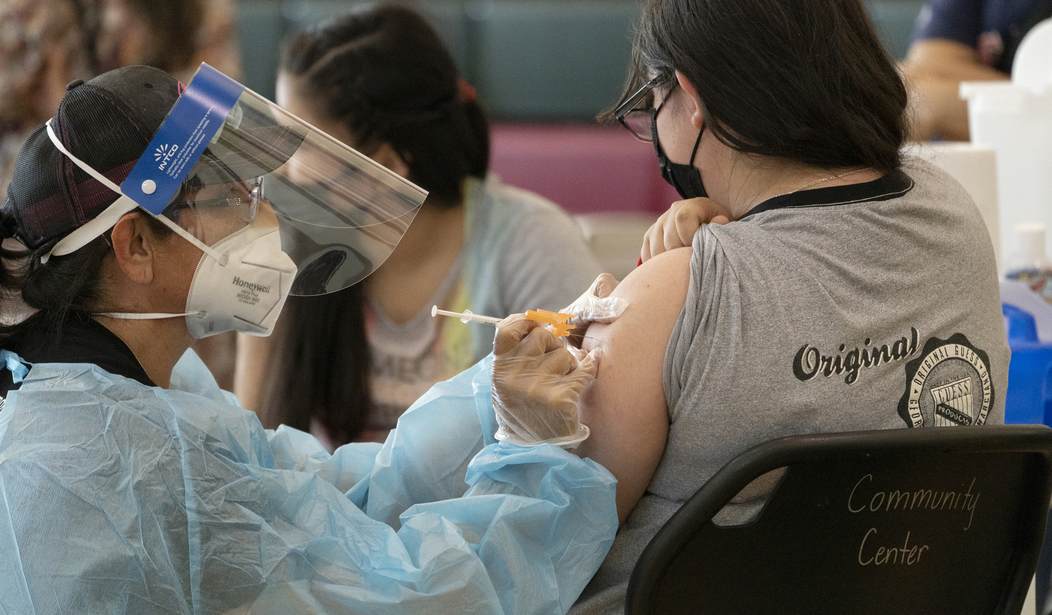We’re now more than two weeks removed from the Pfizer vaccine getting the FDA’s seal of approval, which experts thought (hoped?) would mean an uptick in vaccinations. Some vax refuseniks had cited the “experimental” nature of the vaccines as a reason to wait and see. Now that Pfizer’s fully approved, not just authorized for emergency use, that logic has weakened. Which means we should be seeing a surge in people getting immunized. Are we?
A look at the data provides the answer: …Maybe?
Business Insider considered this same question today and drew a different conclusion. If you compare the two weeks since the FDA approved the vaccine to the two weeks before that, you find that fewer people are getting their shots now than were getting them then. In which case the verdict must be that the experts were wrong. Approval hasn’t goosed holdouts into getting their shots.
Has it?
In the two weeks since the Food and Drug Administration approved Pfizer’s COVID-19 vaccine, the US’s average weekly vaccination rate has declined 38%…
Fauci estimated that 20% or more of vaccine-eligible people who hadn’t yet gotten their shots “will now step forward and get vaccinated” following the FDA’s decision on August 23. At the time, that amounted to around 18 million people.
But just 9 million people have been vaccinated in the last two weeks — down from 11 million people over the previous two-week period, August 8-22.
In the month before Pfizer’s vaccine was approved, the US’s vaccination rate had been trending upward. Average weekly vaccinations rose 46%, as shown in the chart below.
It’s true that vaccinations were trending upward in the two weeks before the FDA announcement and have been trending downward since:

On August 8 the U.S. was averaging just 706,000 doses per day. By August 22, the day before Pfizer was fully approved, the daily average had reached 889,000. On September 7, two weeks after approval, the average had dipped to 826,000. Proof that the FDA’s decision meant little?
Not necessarily. Daily vaccinations in the U.S. bottomed out at 507,000 on July 20, which coincidentally was around the time anxiety about the Delta variant began to rise. For the next six weeks, there was scarcely a day when the average number of doses didn’t climb, eventually reaching 954,000 on September 3. That was last Friday; on that day alone, the U.S. recorded 1.4 million doses, its single biggest day in more than three months. Was it a coincidence that that happened after the FDA fully approved Pfizer or something more?
Our first problem in deciding whether the experts were wrong or right is having to disentangle the “approval effect” (if any) of the FDA’s decision from the panic over Delta that had been driving holdouts to get vaccinated for the previous month. In a world where Delta didn’t exist, would vaccinations have been flat until August 23 and then begun to rise? Alternately, if the FDA hadn’t approved Pfizer on the 23rd, would vaccinations have continued to rise at the same pace throughout the second half of August and into September purely because of fear of Delta?
There’s another wrinkle. Monday was Labor Day, the most anticipated three-day weekend of the year and traditionally a time when people have their last get-togethers of the summer. The fact that many Americans had plans to vacation and socialize may have depressed vaccinations momentarily. (The huge number of doses on September 3, the Friday before Labor Day weekend, may have been a product of people rushing to get the shot before going out to party, in the mistaken belief that they’d be protected immediately.) What would daily vaccinations have looked like last weekend if not for the holiday disruption?
Yesterday the U.S. recorded 959,000 new doses, which would have counted as one of the best days in the two weeks before the FDA approved Pfizer. How much of that is due to the “approval effect”?
Consider too that although the official announcement from the FDA didn’t come until August 23, experts had been hinting that it was a done deal for weeks earlier. Fauci said on August 8 that he hoped full approval would come before the end of the month. The NYT reported on August 20 that the official agency blessing would happen as soon as the 23rd. Some vaccine holdouts may have absorbed that news and decided that if approval was coming, they might as well go get the shot ASAP. Which would mean that even some of the pre-August-23 vaccine numbers would have been influenced by approval.
Finally, there’s this report from ABC on August 31. In the week following the announcement, the number of *first* doses administered to Americans jumped:
[F]ollowing Pfizer’s full approval, the U.S. saw a 17% increase in the number of Americans getting vaccinated with their first dose.
In the week prior to the full approval, an average of about 404,000 Americans were initiating vaccination each day. As of Monday, approximately 473,000 Americans were getting their first shot each day…
Although there does not appear to have been a mad rush of people getting vaccinated in the days immediately following approval, the uptick was significant enough to shift the country’s vaccination trend upward.
I’d bet that the rise of Delta has been vastly more influential in pressuring holdouts to finally give in and get their shots but there’s at least some reason to believe that Pfizer’s approval has contributed. More importantly, it cleared the way for employer mandates, which will end up adding some real fuel to the vaccination rate.








